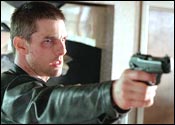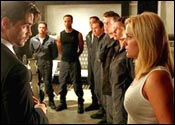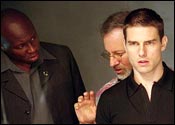
|
Cruise offers pure adult entertainment
Sci-fi weds film noir in Spielberg's Minority Report
|
Jeet Thayil
Minority Report is a genre-vaulting achievement. Steven Spielberg has managed to marry science fiction with film noir and action flicks with philosophical inquiry.
In the process, he has come up with a uniquely Spielbergian equation: the philosophical action film.
That it will be one of this summer's biggest triumphs should come as no surprise to anybody who has watched this filmmaker's astonishing career from its beginnings in 1974 with the beguiling road yarn The Sugarland Express .
You can expect Minority Report to make the adjectivising of the word Spielberg even more widespread.
But what about Philip K Dick, the author whose short story inspired the film? You can expect Dickian to enter the contemporary cinematic lexicon as well. Its meaning? Dickian refers to a harrowing, perhaps drug-induced, vision of a universe where paranoia rules and everybody runs.
Everybody Runs, of course, is the film's tagline. Dick, who died of a stroke at 53, was a prolific writer and an even more prolific drug user. He always denied that his use of drugs affected his work, but it is difficult to believe him quite wholeheartedly in that assessment. It is instructive, for instance, to note how many of the characters in his hundreds of stories used drugs, not to mention the protagonist of Minority Report, the Tom Cruise character John Anderton.
One of Dick's books, A Scanner Darkly describes a nightmarish world in which a narcotics agent ends up narking on himself. The book, scheduled to be turned into a film by Richard Linklater, is about a society in which drugs have become a force of control. If that sounds like the work of William Burroughs, particularly his signature novel Naked Lunch, it is understandable. The two writers shared a vision of the world as a totalitarian dystopia, in which government agencies seek to keep the general populace subservient through drugs.
In his later life, Dick heard voices in the air around him. His mind-bending fiction may draw some of its strange power from the altered states he routinely experienced. But there is more to his work than mere hallucination. Dick was also a lifelong reader of religious texts, philosophical treatises and metaphysics. His many obsessions show up in Minority Report, sometimes with harrowing results.
 Anderton, a cop in the year 2054, heads Pre-Crime, a federal crime-fighting unit that predicts the future to arrest murderers before they have committed their crimes. Pre-Crime uses the powers of a trio of Pre-Cogs who can see the future before it happens. This trio, two male twins and a woman Agatha, float in a sensory deprivation nutrient fluid, their brains connected to huge screens where the future plays out its murder-fueled rage.
Anderton, a cop in the year 2054, heads Pre-Crime, a federal crime-fighting unit that predicts the future to arrest murderers before they have committed their crimes. Pre-Crime uses the powers of a trio of Pre-Cogs who can see the future before it happens. This trio, two male twins and a woman Agatha, float in a sensory deprivation nutrient fluid, their brains connected to huge screens where the future plays out its murder-fueled rage.
Anderton believes in Pre-Crime and little else. He is a man whose son is dead, whose wife has left him, who is a 'whiffer' of drugs. He is obsessed by his lost family, playing over and over the moment when his son was lost to a kidnapper. His life is untidy and spinning out of control, his work is taut as a tightrope. He is in single-minded pursuit of future criminals, attempting to assuage his guilt by bringing to justice other potential killers.
When the Pre-Cog Agatha sees Anderton killing a man in the future, he becomes a fugitive hunted by his own team. He returns to take Agatha with him, to find out how he has been set up. The ending of Minority Report may be its weakest sequence. That is the only time the viewer feels he is watching a conventional action blockbuster --- all the loose ends are tied up and everything is neatly put away. Until then it is an unforgettable ride.
Cruise has taken on his darkest role yet. He allows his character to be tortured, blinded, shaved, drugged, anaesthetised and betrayed, and comes out the better for it. Not since Stanley Kubrick's Eyes Wide Shut has he been given such a substantial role. He plays it with relish and aplomb. At times he smiles without hope, his drug-clouded vision providing paranoid fantasies that prove all too true.
As with his role in Magnolia, Cruise can seem tainted yet morally centered. It is a balancing act few actors can pull off.
 The film is an exercise in uncanny casting. Max Von Sydow as Anderton's mentor tormentor is superb. But the most luminous turn belongs to Samantha Morton's Agatha. She is transparent at times, her skin and eyes see-through. It will be difficult to prove, but it may be likely that Morton has the single most bloodcurling scream in motion picture history. Her role in Jesus' Son, the film version of a Denis Johnson novel, merely set the pace. This young actress is an anxious pleasure to watch.
The film is an exercise in uncanny casting. Max Von Sydow as Anderton's mentor tormentor is superb. But the most luminous turn belongs to Samantha Morton's Agatha. She is transparent at times, her skin and eyes see-through. It will be difficult to prove, but it may be likely that Morton has the single most bloodcurling scream in motion picture history. Her role in Jesus' Son, the film version of a Denis Johnson novel, merely set the pace. This young actress is an anxious pleasure to watch.
There are echoes in Minority Report of AI: Artificial Intelligence, and of Blade Runner. The disappointing reception afforded to AI, a monumental collaboration between the late Stanley Kubrick (it was his last film), and Spielberg may have had something to do with the less risky premise of Report.
Future critics will, I am sure, give AI its rightful due, as they do Apocalypse Now, also considered a failure when it was first released. But where AI had elements of a boy's own adventure, Minority Report is, without doubt, adult entertainment.
There is a cinematic language Spielberg has developed, a very specific visual style, a Spielbergian style, common to both films. There are stylised sequences. But more than style, the film seems to possess a philosophical base on which it is solidly grounded. On top of this, the fluid emblems of style play themselves out to the pleasure of the viewer.
As in Blade Runner, the future appears to be little more than an arena in which to sell things. Advertisements run riot throughout the film. There are constant references to consumer products and stores such as Gap, Pepsi and Bvlgari. In fact, product placement seems endless. It is a future world in which technology serves commerce, not knowledge or humanity.
Anderton sees himself change into another man. And at one point, actually alters his facial topography with a handy little gadget. Identity is fluid. This is a Dickian preoccupation. But underneath it all is a solid philosophical premise: the question of free will versus predestination.
Can knowing the future change our actions or are we doomed to unalterable destiny?
 It is difficult not to compare Minority Report with two other major movie releases this year. Star Wars -- Episode II: Attack Of The Clones and The Bourne Identity.
It is difficult not to compare Minority Report with two other major movie releases this year. Star Wars -- Episode II: Attack Of The Clones and The Bourne Identity.
Whereas The Clones seemed rushed and sometimes flawed, Minority Report has polish and sheen. Whereas Bourne is one-dimensional, Report is multi-layered. It is the kind of movie that grows with repeated viewings.
The first time I saw Blade Runner in Mumbai in 1982, I knew that my idea of science fiction would henceforth hinge on my experience of watching that film. Like Minority Report, Blade Runner was an adaptation of the Philip K Dick novel Do Androids Dream of Electric Sheep?
While watching Minority Report I experienced a similar sense of future past. Henceforth, my idea of action movies and science fiction, I knew, would hinge on the experience of watching Minority Report.
Just as Blade Runner became a standard for a certain type of 20th century filmmaking, Minority Report is destined to become a standard for the 21st.
|